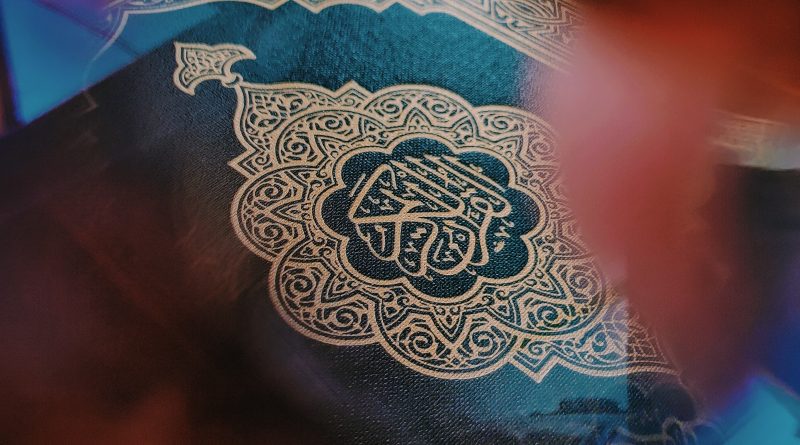Tafsir of Surah al-Fatihah: al-Tafsir al-Muyassar
The book Al-Tafsir al-Muyassar was written by a group of scholars under the direction of sheikh Saalih Aal al-Sheikh, Minister of Islamic Affairs for the Kingdom of Saudi Arabia. It was designed to be a simple and easy-to-understand tafsir according to the understanding of the salaf. What follows is its brief tafsir of surah al-Fatihah and translation:
بِسْمِ اللَّـهِ الرَّحْمَـٰنِ الرَّحِيمِ
In the Name of Allah, al-Rahman al-Raheem (1)
سورة الفاتحة سميت هذه السورة بالفاتحة؛ لأنه يفتتح بها القرآن العظيم، وتسمى المثاني؛ لأنها تقرأ في كل ركعة، ولها أسماء أخر. ـ
Surah al-Fatihah – This surah is called al-Fatihah [the Opening] because it is what the magnificent Qur’an opens with. And it is called al-Mathaani [the oft-repeated] because it is recited in every unit of prayer. And it also has other names.
أبتدئ قراءة القرآن باسم الله مستعينا به . ـ
One begins reciting the Qur’an with the name of Allah, seeking aid in Him.
ـ {اللهِ} علم على الرب- تبارك وتعالى- المعبود بحق دون سواه، وهو أخص أسماء الله تعالى، ولا يسمى به غيره سبحانه. ـ
“Allah” is a designation indicating the Rabb – blessed and exalted is He – , the rightful object of worship to the exclusion of any others. And this is the most exclusive of Allah’s names, and none other than Him are called by it.
ـ {الرَّحْمَنِ} ذي الرحمة العامة الذي وسعت رحمته جميع الخلق . ـ
“al-Rahman” is the possessor of a general rahmah [mercy], the One whose rahmah extends to all of the creation.
ـ {الرَّحِيمِ} بالمؤمنين، وهما اسمان من أسمائه تعالى، يتضمنان إثبات صفة الرحمة لله تعالى كما يليق بجلاله. ـ
“al-Raheem” [the especially merciful] to the believers. And these are two of His names, both of which include an affirmation of Allah’s attribute of al-Rahmah as is befitting of His majesty.
الْحَمْدُ لِلَّـهِ رَبِّ الْعَالَمِينَ
All praise belongs of the Lord of all creation (2)
ـ {الحَمْدُ للهِ رَبِّ العَالَمِينَ} الثناء على الله بصفاته التي كلُّها أوصاف كمال، وبنعمه الظاهرة والباطنة، الدينية والدنيوية، وفي ضمنه أَمْرٌ لعباده أن يحمدوه، فهو المستحق له وحده، وهو سبحانه المنشئ للخلق، القائم بأمورهم، المربي لجميع خلقه بنعمه، ولأوليائه بالإيمان والعمل الصالح. ـ
This is praising Allah for His attributes, all of which are attributes of perfection. And it is praising Him for His blessings – both outwardly and inwardly, in terms of the deen and in terms of the dunya.
- And in its contents there is a command for His slaves to praise Him, for He alone is deserving of that, and He is the originator of the creation, the establisher and maintainer of their affairs, the nurturer of all of His creation through His blessings and towards His allies in particular through al-eemaan and righteous good deeds.
الرَّحْمَـٰنِ الرَّحِيمِ
al-Rahman al-Raheem (3)
ـ {الرَّحْمَنِ} الذي وسعت رحمته جميع الخلق، {الرَّحِيمِ}، بالمؤمنين، وهما اسمان من أسماء الله تعالى. ـ
“al-Rahman” is the One whose rahmah [mercy] extends to all creation. “al-Raheem” [the especially merciful] to the believers. And these are two names from the names of Allah.
مَالِكِ يَوْمِ الدِّينِ
The Owner of the Day of Recompense (4)
وهو سبحانه وحده مالك يوم القيامة، وهو يوم الجزاء على الأعمال. ـ
And He alone is the owner of the Day of Judgement, and that is the day of recompense for deeds.
وفي قراءة المسلم لهذه الآية في كل ركعة من صلواته تذكير له باليوم الآخر، وحثٌّ له على الاستعداد بالعمل الصالح، والكف عن المعاصي والسيئات. ـ
- And in the Muslim’s recitation of this ayah in every unit of his prayers there is a reminder for him of the Last Day, and an incitement for him to prepare for it by performing righteous good deeds and abstaining from acts of disobedience and sins.
إِيَّاكَ نَعْبُدُ وَإِيَّاكَ نَسْتَعِينُ
You alone do we worship and You alone do we ask for aid (5)
إنا نخصك وحدك بالعبادة، ونستعين بك وحدك في جميع أمورنا، فالأمر كله بيدك، لا يملك منه أحد مثقال ذرة. وفي هذه الآية دليل على أن العبد لا يجوز له أن يصرف شيئًا من أنواع العبادة كالدعاء والاستغاثة والذبح والطواف إلا لله وحده، وفيها شفاء القلوب من داء التعلق بغير اله، ومن أمراض الرياء والعجب، والكبرياء. ـ
We single You out alone for worship, and we seek aid from You alone in all of our affairs. For all affairs are in Your hand – no one else possesses even an atom’s weight of anything.
- And in this ayah there is a proof that the slave is not permitted to turn any portion of any form of worship – such as supplication, or supplication in times of severe difficulty, or sacrifice, or tawaaf – to any one or thing other than Allah alone.
- And in that there is a cure for the heart from the disease of attaching one’s heart to other than Allah, as well as a cure from the sicknesses of showing off, self-amazement, and pride.
اهْدِنَا الصِّرَاطَ الْمُسْتَقِيمَ
Guide us to the Straight Path (6)
دُلَّنا، وأرشدنا، ووفقنا إلى الطريق المستقيم، وثبتنا عليه حتى نلقاك، وهو الإسلام، الذي هو الطريق الواضح الموصل إلى رضوان الله وإلى جنته، الذي دلّ عليه خاتم رسله وأنبيائه محمد صلى الله عليه وسلم، فلا سبيل إلى سعادة العبد إلا بالاستقامة عليه. ـ
Show us and direct us and grant us the accord to follow the straight way, and make us firm upon it until we meet You. And that is al-Islaam, that which is the clear way which leads to the pleasure of Allah and upon His Jannah. It is that which the seal of Allah’s messengers and His prophets – Muhammad – showed us. So there is no path to the slave’s ultimate joy except by means of being firm and upright upon this.
صِرَاطَ الَّذِينَ أَنْعَمْتَ عَلَيْهِمْ غَيْرِ الْمَغْضُوبِ عَلَيْهِمْ وَلَا الضَّالِّينَ
The path of those upon whom You have bestowed favor, not of those who have evoked [Your] anger or of those who are astray (7)
طريق الذين أنعمت عليهم من النبيين والصدِّيقين والشهداء والصالحين، فهم أهل الهداية والاستقامة، ولا تجعلنا ممن سلك طريق المغضوب عليهم، الذين عرفوا الحق ولم يعملوا به، وهم اليهود، ومن كان على شاكلتهم، والضالين، وهم الذين لم يهتدوا، فضلوا الطريق، وهم النصارى، ومن اتبع سنتهم. وفي هذا الدعاء شفاء لقلب المسلم من مرض الجحود والجهل والضلال، ودلالة على أن أعظم نعمة على الإطلاق هي نعمة الإسلام، فمن كان أعرف للحق وأتبع له، كان أولى بالصراط المستقيم، ولا ريب أن أصحاب رسول الله صلى الله عليه وسلم هم أولى الناس بذلك بعد الأنبياء عليهم السلام، فدلت الآية على فضلهم، وعظيم منزلتهم، رضي الله عنهم. ـ
The way of those upon whom You have bestowed favor from amongst the prophets, the truthful ones, the martyrs and the righteous ones. For they are the people of guidance and uprightness. And do not make us among those who traverse the way of those who have evoked Your anger – those who know the truth but do not act according to it, and they are the Jews and those in their same mold. Nor those who are astray are those who are not guided, so they stayed from the path. And there are the Christians and those who follow their ways.
- And in this supplication there is a cure for the heart of the Muslim from the sickness of denying the truth and ignorance and misguidance.
- And in this there is also an indication that the greatest blessing without any exception is the blessing of Islam. For whoever recognizes the truth and follows it, then he is upon the Straight Path. And there is no doubt that the companions of the Messenger of Allah are the best of the people in that regard, after the prophets. So this ayah indicates their merits and the greatness of their stations – may Allah be pleased with them.
ويستحب للقارئ أن يقول في الصلاة بعد قراءة الفاتحة: آمين، ومعناها: اللهم استجب، وليست آية من سورة الفاتحة باتفاق العلماء؛ ولهذا أجمعوا على عدم كتابتها في المصاحف. ـAnd it is highly recommended that after reciting al-Fatihah in one’s salaah that he say “aameen“. And meaning of that is, “Oh Allah, accept this.” And saying “aameen” is not an ayah of surah al-Fatihah according to the agreement of the scholars, and for this reason they agreed upon not writing it down in the mushafs.
[al-Tafsir al-Muyassar pg. 1]This translation is part of a series of sound explanations of surah al-Fatihah, which also includes:
Source: https://tulayhah.wordpress.com/2016/02/18/tafsir-of-surah-al-fatihah-al-tafsir-al-muyassar/

